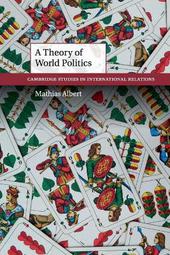
|
A Theory of World Politics
Paperback / softback
Main Details
| Title |
A Theory of World Politics
|
| Authors and Contributors |
By (author) Mathias Albert
|
| Series | Cambridge Studies in International Relations |
|---|
| Physical Properties |
| Format:Paperback / softback | | Pages:277 | | Dimensions(mm): Height 229,Width 150 |
|
| ISBN/Barcode |
9781316601563
|
| Classifications | Dewey:327 |
|---|
| Audience | | Professional & Vocational | |
|---|
| Illustrations |
4 Halftones, black and white
|
|
Publishing Details |
| Publisher |
Cambridge University Press
|
| Imprint |
Cambridge University Press
|
| Publication Date |
8 February 2018 |
| Publication Country |
United Kingdom
|
Description
In this book, Mathias Albert develops an ambitious theoretical framework that describes world politics as a specific social system set within the wider political system of world society. Albert's analysis of the historical evolution and contemporary form of world politics takes the theory of social differentiation as its starting point. World politics is a specific, relatively recent form of politics and Albert shows how the development of a distinct system of world politics first began during the long nineteenth century. The book goes on to identify the different forms of social differentiation that underlie the variety of contemporary forms of organizing political authority in world politics. Employing sociological and historical perspectives, A Theory of World Politics also reflects critically on its relation to accounts of world politics in the field of international relations and will appeal to a wide readership in a range of fields.
Author Biography
Mathias Albert is Professor of Political Science at Universitat Bielefeld, Germany.
Reviews'Great news: world society exists! In his fascinating new book, Mathias Albert tells the story of the evolutionary emergence and organization of world politics, situating it in a sophisticated theoretical framework for which social differentiation is the key to understanding the evolution of society in general and, thus, also the key to understanding world society (Part 1) and world politics (Part 2). Even though Albert is professor of political science (at the University of Bielefeld), A Theory of World Politics is mainly written for an international relations audience and is informed by sociology and history, this book is a valuable read for international legal scholars as well. If you are prepared to face some theoretical challenges, you can learn a lot about how world politics emerged and how it is organized today, which is arguably an important field for international lawyers in an insecure 'Trump era'.' Lando Kirchmair, European Journal of International Law
|